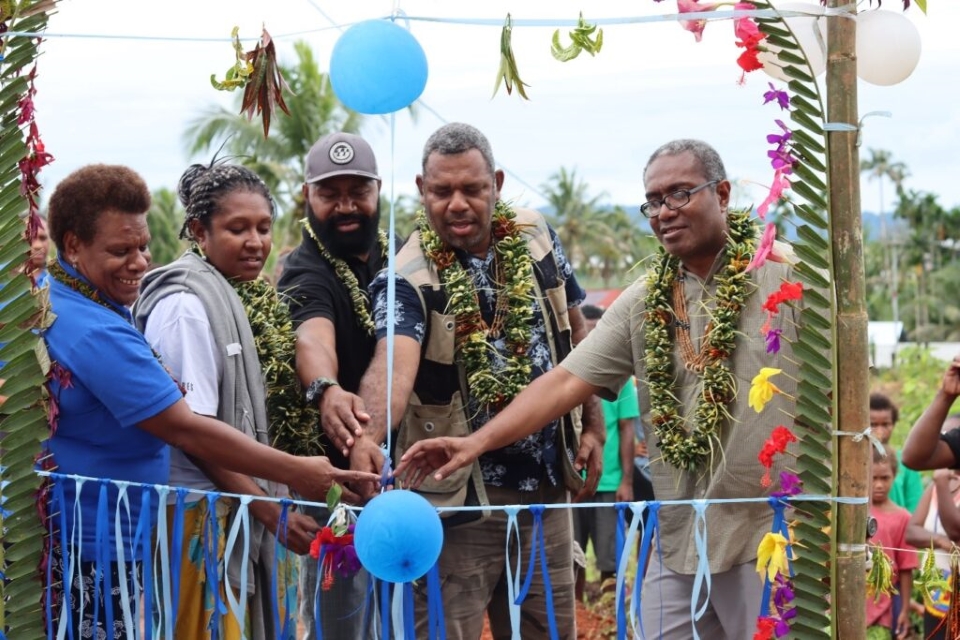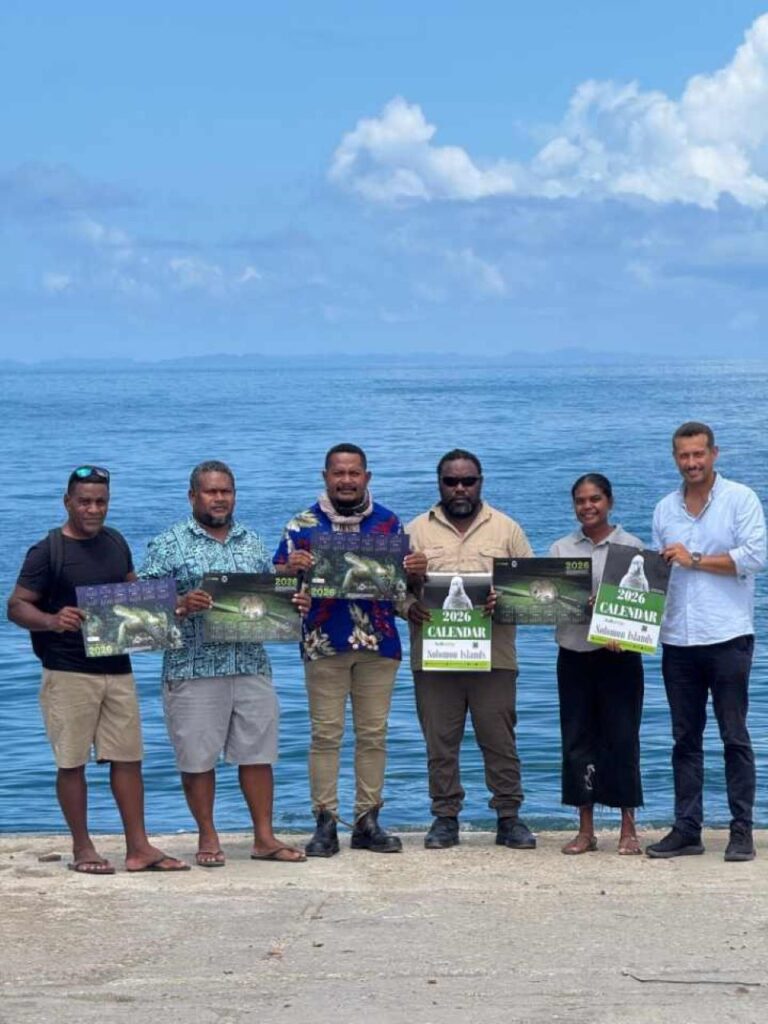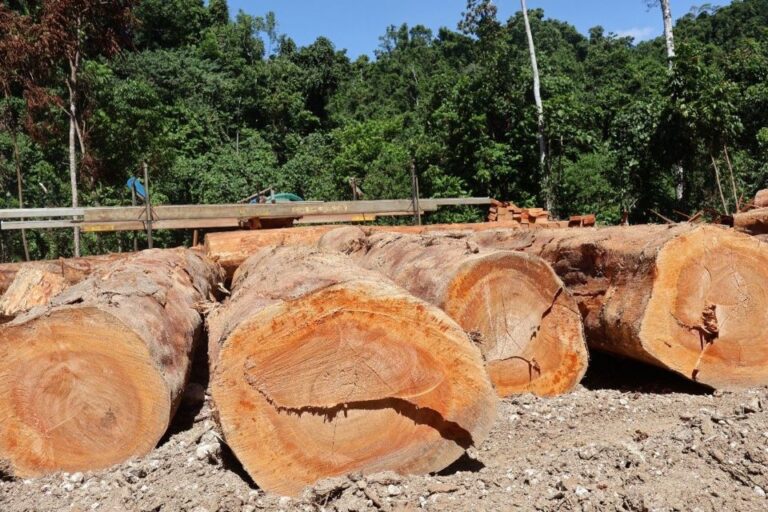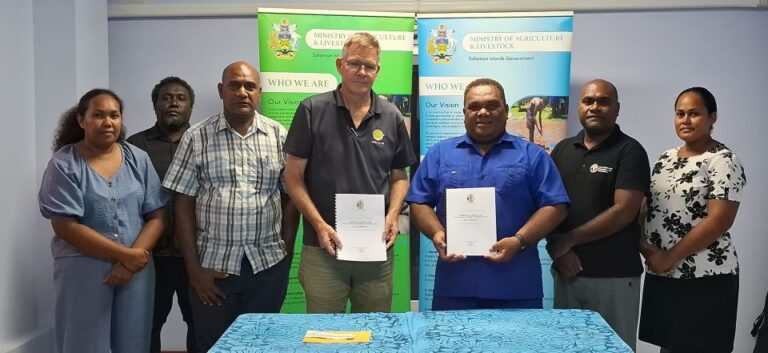ACCESS to electricity in rural areas of Solomon Islands is a widespread issue faced by most communities living in those parts of the country. The Stimulating Progress Towards Improved Rural Electrification in Solomon Islands (SPIRES) project, implemented thru UNDP by the Ministry of Mines, Energy and Rural Electrification (MMERE), aims to promote electricity for rural communities through renewable energy.
As part of the SPIRES project, both institutions have partnered with the Ministry of Environment, Climate Change, Disaster Management and Meteorology (MECDM) for the installation of two solar hybrid power systems that were inaugurated on 6th and 7th October at Rokera Provincial Secondary School, and Hunanawa Community in East Are’are, both in southern part of Malaita.
The first launching – on 6th October at Rokera Provincial Secondary School, counted with the presence of Hon. Junior Peter Kenilorea, Member of Parliament for East Are’are, and representatives from the ministries, the provincial government, the energy sector and UNDP.
It was organized aligning with the school’s graduation – bringing together officials, staff, students, parents and guardians, and people from nearby villages. They all witnessed for the first time the functioning of the 36kWp solar photovoltaic hybrid system. This system will help the school switch from diesel generator-sets to solar power, a more reliable source of energy that will electrify the school 24hrs a day.
In his remarks Hon. Junior Peter Kenilorea affirmed: “Education combined with electricity are the two most powerful tools for development that the world has ever seen. Scientists around the world agree that for the past 200 hundred years the biggest invention has been electricity.”
The school principle expressed his gratitude towards the project, the Ministry and UNDP for selecting Rokera as one of the few schools to benefit from this development to save costs and contribute to green house gas emissions reductionsThis is a pilot initiative but it is a great example for all schools located in rural areas of Solomon Islands to get inspired and hopefully benefit also from such development in a near future and it eventually expands enlightening many future generations to come.
The permanent secretary of the Ministry of Mines, Energy and Rural Electrification (MMERE)Dr. Chris Vehe stated in his remarks that: “The increasing usage of fossil fuel has been replaced with a more sustainable energy, a huge saving purchasing diesel what will result in an increase of the amount spent by the school to improve the quality of education.”
After Rokera, the following day the community of Hunanawa in East Are’are and nearby villages also witnessed the official launch of their solar hybrid system. The 30kWp solar PV system connected to a battery bank that has the power to supply electricity for more than 100 houses – 50 of them alone within the Hunanawa community.
The Honorable Member for East Are’are graced Hunanawa Community with his presence stating the importance of a community working together is vital in such developments in order to maintain the operation of the system for 5 – 10 years to come. He also acknowledged the cooperation of the community for working together with SPIRES Project and the Ministry for the successful completion of the solar hybrid system installation.
The Chairman of the Solar PV System Committee expressed his sincere acknowledgement towards the project, the MMERE, UNDP, the funding agency the Global Environmental Fund (GEF), other Ministry partners and stakeholders taking part in initiating and implementing this project.
Solar hybrid systems are an example of renewable energy, cutting down the use of fossil fuel, prioritizing the consumption of solar power and therefore reducing greenhouse gas emissions, which is the SPIRES project main objective. The project helps Solomon Islands, as one of the most vulnerable countries to global warming related issues, to face and mitigate the climate crisis.
According to UNDP Programme Manager Ms. Vini Talai: “Villagers can now use electricity to stimulate economic growth in their communities by switching from using manual sewing machines to electric sewing machines and other electrical products”.
One of the main challenges of solar hybrid systems is the technical maintenance of the system by the community. As part of the project, SPIRES will make sure equipment is monitored and maintained and will assist the school and the community – through capacity building – to integrate a financial mechanism towards looking after the system before the work is handed over to the MMERE/Energy Division.
According to Dr. Vehe P.S for MMERE, the ministry is working to design a renewable energy policy that can be implemented throughout the Solomon Islands. Huannawa can share good practices and lessons learnt for the ongoing implementation of this plan making it appropriate for the entire country. In addition, the inclusion of women and young leaders is also crucial to the development of a national strategy for renewable energy..
This is a big step forward for Solomon Islands in the path of renewable energy with a specially positive outcome for rural areas. It paves the way for the Government of Solomon towards a more comprehensive renewable energy strategy and policy and a big economic boost for both community and school.
The SPIRES project is being implemented by the Ministry of Mines, Energy & Rural Electrification under its Energy Division with financial support from the Global Environmental Facility through the UN Development Programme.
MMERE Press




